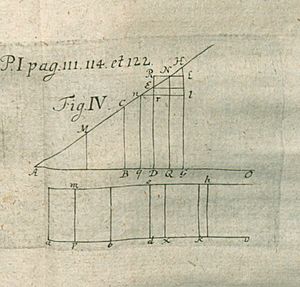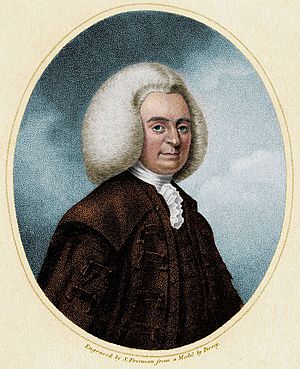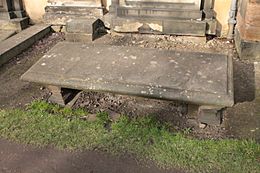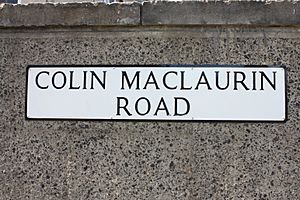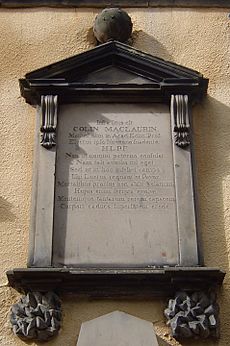Colin Maclaurin facts for kids
Quick facts for kids
Colin Maclaurin
|
|
|---|---|
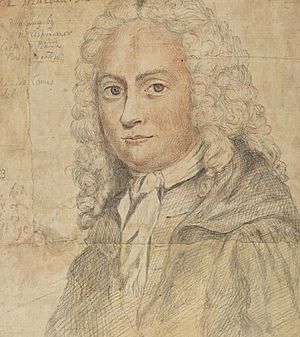
Drawing by David Steuart Erskine c. 1795, from a portrait by James Ferguson
|
|
| Born | February 1698 |
| Died | 14 June 1746 (aged 48) |
| Nationality | Scottish |
| Citizenship | Great Britain |
| Alma mater | University of Glasgow |
| Known for | Euler–Maclaurin formula Maclaurin's inequality Maclaurin series Maclaurin spheroid Maclaurin–Cauchy test Braikenridge–Maclaurin theorem Trisectrix of Maclaurin |
| Awards | Grand Prize of the French Academy of Sciences |
| Scientific career | |
| Fields | Mathematician |
| Institutions | Marischal College, University of Aberdeen University of Edinburgh |
| Academic advisors | Robert Simson |
| Notable students | Robert Adam |
Colin Maclaurin (born February 1698 – died 14 June 1746) was a brilliant Scottish mathematician. He made big discoveries in areas like geometry and algebra. People remember him as a child genius. He even held the record for being the youngest professor ever for a long time! A special math idea called the Maclaurin series is named after him.
His last name was sometimes spelled M'Laurine a long time ago.
Contents
Early Life and Amazing Talent
Colin Maclaurin was born in a place called Kilmodan in Argyll, Scotland. His father passed away when Colin was just a baby. His mother also died before he turned nine years old. After that, his uncle, Daniel Maclaurin, took care of him and made sure he got an education. Colin was a true child prodigy, meaning he was super smart from a young age. He started university when he was only 11 years old!
Becoming a Young Professor
When Colin was eleven, he went to the University of Glasgow. He earned his first degree just three years later. He wrote a paper about the Power of Gravity. He stayed at Glasgow to study religion until he was 19.
At 19, he entered a ten-day competition. He won and became a professor of mathematics at Marischal College in the University of Aberdeen. This made him the youngest professor in the world! He held this record until 2008.
During his breaks from teaching, Maclaurin visited London. There, he met famous thinkers like Isaac Newton. He even became a member of the Royal Society, a very important group of scientists.
In 1722, he traveled to Europe. He worked as a tutor for a young man named George Hume. While in Lorraine, he wrote an essay about how objects hit each other. This essay won a big prize from the French Academy of Sciences in 1724. After his student passed away, Maclaurin went back to Aberdeen.
In 1725, Isaac Newton himself suggested that Maclaurin should teach math at the University of Edinburgh. Newton was so impressed that he even offered to pay Maclaurin's salary! Colin Maclaurin took the job and helped make the university famous for science.
His Math Discoveries
Maclaurin used a math tool called Taylor series. He used it to find the highest and lowest points on graphs. He also used it to find where curves change direction. The Taylor series was known before Maclaurin, but he used it in new ways. Because of his important work, the Taylor series when it starts at zero is often called the Maclaurin series.
Maclaurin also studied how gravity pulls on different shapes, especially Maclaurin spheroids. He showed that a flattened sphere could be stable under gravity. This idea is still important in science today. He talked a lot about his ideas with other famous mathematicians like Alexis Clairaut.
He also discovered the Euler–Maclaurin formula, at the same time as another mathematician named Euler. He used this formula to add up numbers in a pattern. He also used it to figure out Stirling's formula.
Maclaurin also worked on elliptic integrals. These are special types of math problems that are hard to solve. He found ways to make them simpler.
In a book published after he died, called Treatise of Algebra, Maclaurin showed a way to solve certain math problems with multiple unknowns. This was two years before Gabriel Cramer published a similar rule, now known as Cramer's rule.
Life and Legacy
In 1733, Maclaurin married Anne Stewart. They had seven children together. His oldest son, John Maclaurin, became a judge. He also helped start the Royal Society of Edinburgh.
Maclaurin was very active in stopping the Jacobite rising of 1745. This was a time when people tried to put a different king on the throne. He helped organize the defense of Edinburgh. When the army entered the city, he had to leave and went to York.
On his way south, Maclaurin fell off his horse. The stress and cold from this trip made him sick. He returned to Edinburgh after the army left, but he died soon after.
He is buried in Greyfriars Kirkyard in Edinburgh. There is a simple stone with his initials and dates. A more detailed memorial is on the church wall.
The Maclaurin Society at Glasgow University is named after him. There is also a road in Edinburgh named Colin MacLaurin Road.
Important Books He Wrote
Some of his most important works include:
- Geometria Organica - 1720
- De Linearum Geometricarum Proprietatibus - 1720
- Treatise on Fluxions - 1742 (This book explained Isaac Newton's math methods in a clear way.)
- Treatise of Algebra - 1748 (Published after he died.)
- Account of Newton's Discoveries - Also published after he died, as it was not finished.
The new Mathematics building at Heriot-Watt University in Edinburgh is also named after Colin Maclaurin.
Images for kids
See also
 In Spanish: Colin Maclaurin para niños
In Spanish: Colin Maclaurin para niños
- Braikenridge–Maclaurin theorem
- Trisectrix of Maclaurin
- Cayley's sextic
- Cramer's paradox
- Hesse configuration
- Sinusoidal spiral
 | Kyle Baker |
 | Joseph Yoakum |
 | Laura Wheeler Waring |
 | Henry Ossawa Tanner |


